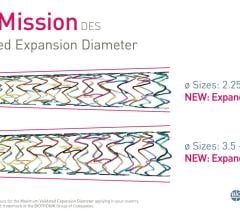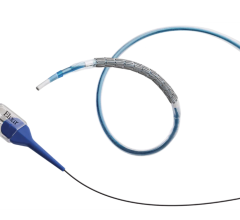
Nov. 2, 2011 – The U.S. Food and Drug Administration (FDA) granted market clearance for the Xience Prime everolimus-eluting coronary stent system for the treatment of coronary artery disease. Xience Prime uses the same drug and biocompatible polymer as the Xience V everolimus-eluting coronary stent system, but features an enhanced stent design and a delivery system designed for greater flexibility, better radial strength, longitudinal strength and more accurate stent placement.
"Drug eluting stent technology continues to advance, leading to improved outcomes for patients with coronary artery disease," said Marco Costa, M.D., Ph.D., professor of medicine, director of the interventional cardiovascular center and director of the research and innovation center, Harrington-McLaughlin Heart and Vascular Institute, University Hospitals, Case Western Reserve University in Cleveland, Ohio, and principal investigator of the global SPIRIT PRIME trial. "With Xience Prime, for the first time in the U.S., physicians have a 38 mm everolimus-eluting stent for the treatment of long lesions. The enhanced deliverability and wide range of sizes, including a small-vessel 2.25 mm-diameter stent, will improve our ability to access challenging, complex lesions, and thereby improve care for our patients."
With the introduction of Xience Prime in the United States, Abbott Vascular now offers physicians an expanded range of drug eluting stents (DES) supported by the clinical results from the SPIRIT family of trials.
Xience Prime uses Abbott's next-generation Multi-Link 8 stent design. It utilizes cobalt chromium technology and features a "peak-to-valley" mechanical design that imparts longitudinal strength and stability to the stent. To date, the stents based on the Multi-Link design – including Vision, Xience V, Promus and Xience Prime – represent more than 300 million implant months, which is a measure of the clinical experience that supports this stent design. In addition, Xience Prime features one of the thinnest DES struts available while maintaining radial strength to support the vessel, and it provides excellent visibility under X-ray during stent implantation procedures. The stent is offered in long lengths up to 38 mm.
FDA approval was supported by results from the SPIRIT PRIME clinical trial, a prospective, open-label trial that evaluated Xience Prime in 500 patients with coronary artery disease. The trial met its primary endpoint, with low rates of target lesion failure (TLF) at one year. Stent thrombosis rates at one year also were very low. Costa will present the full results from the SPIRIT PRIME study Tuesday, Nov. 8, at the 23rd annual Transcatheter Cardiovascular Therapeutics (TCT) scientific symposium in San Francisco.
Xience Prime received CE mark in 2009. With FDA approval, the stent is now available in the United States, Europe, the Middle East and most of Asia.
For more information: www.abbott.com


 July 02, 2024
July 02, 2024 









